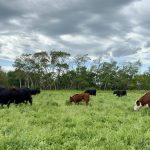The Canadian Food Inspection Agency says it is streamlining the process, but it has an obligation to do its due diligence
An interesting position: that’s the place Avivagen president Cameron Groome says he is in with regard to Canadian registration for a new product.
The Ottawa-based company has developed a carotenoid-based feed additive that it says could do the same health protection and growth promotion jobs in livestock that are now done by antibiotics.
However, Canadian registration for the product isn’t likely anytime soon, said Groome, so Canadian livestock producers won’t have access to a product that several Asian countries are in the process of approving.
Read Also

Rented farmland jumps 3.4 million acres in Saskatchewan and Alberta
Farmland rented or leased in the two provinces went from 25.7 million acres in 2011 to 29.1 million in 2021, says Census of Agriculture data.
“With the new regulations coming in and with no real pathway for registering technical feed additives, it certainly puts our industry in an interesting position, with interesting firmly in quotation marks,” said Groome.
Antibiotic use in livestock production is under increasing scrutiny because of its potential role in the evolution of antibiotic resistant bacteria. Proliferation of such bacteria, exacerbated by antibiotic use, has dire implications for human and animal health because common remedies may not work on illnesses and infections.
Those concerns have prompted several countries to develop new regulations that are generally aimed at reducing antibiotic use in livestock, particularly when used to prevent illness and increase growth rates.
Groome said Avivagen’s product, called OxC-beta, could help address the issue.
“We’ve very much been doing a lot of our business, most of our business development, in Asia, where there’s 20 times the volume of feed consumed as anything we do in Canada,” he said.
“Every country I visit is planning further restrictions on antibiotic use or outright bans on antibiotic use. That is not going away, so in Canada I think we need to get our act together and recognize that that’s already almost become the global export standard, and its very rapidly becoming the domestic preference, if not requirement. Just hoping it will go away is not a strategy.”
Registration for livestock feed additives is managed by the Canadian Food Inspection Agency, which is currently upgrading the registration process.
Sergio Tolusso, a national manager in the animal feed division of the CFIA, said regulatory proposals to modernize the process are expected in 2017.
Though ad hoc changes have been made, the regulations date back to the 1980s.
Tolusso said changes may bring more flexibility to the livestock feed approval process, in part by considering approvals for the same product in other countries.
“There’s some due diligence on our part as the government of Canada to make sure that an ingredient meets the government of Canada requirements,” he said.
He said there may be opportunities for Canada to collaborate more with the U.S. so products could come to market at the same time.
Tolusso said amendments to the federal feeds act in 2015 gave the CFIA the right to recognize approvals done by other jurisdictions, which they are also exploring.
Jean Szkotnicki, president of the Canadian Animal Health Institute, said addressing regulatory hurdles for new animal health products has long been a focus for the institute and other organizations.
“One of the challenges has been that when you have a product that has either physiological or functional benefits or health claims, often these products in Canada are considered drugs. Under the drug regulation there are very specific … manufacturing practices.”
Some of the manufacturing methods for feed additives might not meet the stringent regulations that govern drug manufacturing, which prevents their registration.
“What we have been trying to do is have these products registered through the feed side of the industry, through CFIA, which can accept the different manufacturing practices, and obviously that takes a lot of cultural change that has to happen within the regulatory agency,” she said.
Szkotnicki said she is aware of Avivagen’s product and its frustrations with regulations. Part of it likely relates to claims made and data that supports those claims, she added.
“I would like to see a pathway be found for registration of this type of product, recognizing that with the Avivagen discovery work, that was largely taxpayer funding,” said Szkotnicki. “It would be nice if we could use our own discovery, so hopefully we can find that commercialization pathway.”
OxC-beta was originally developed by scientists at the National Research Council.
Groome agreed there is some irony in a Canadian-invented product facing difficulty with registration here while being accepted in other countries.
That could put Canadian livestock producers at a disadvantage, whether it is their inability to use OxC-beta or some other product that could help reduce antibiotic use.
“This is not an issue that’s going to go away or that producers in Canada are going to be able to lobby their way out of,” he said.
“We’ve got to be in a position to respond.”
barb.glen@producer.com















